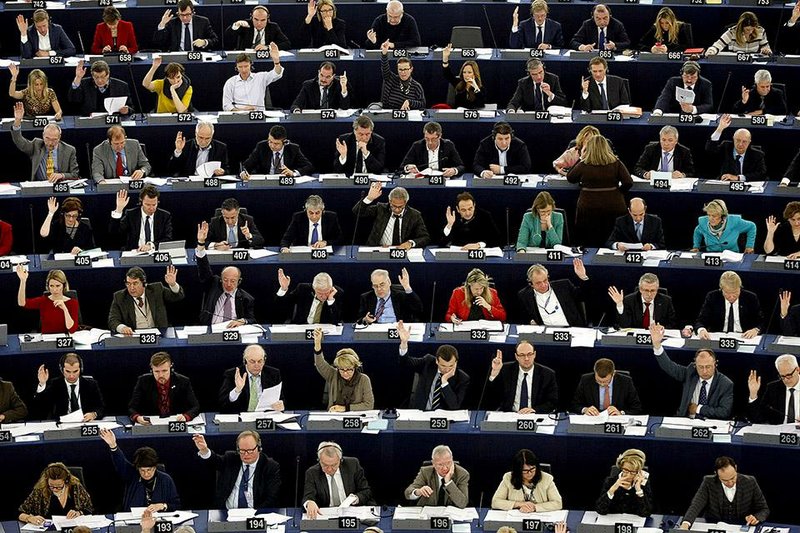LONDON -- Strains between Israel and parts of Europe intensified Wednesday when the European Union's second-highest court reversed the bloc's designation of the militant Palestinian group Hamas as a terrorist organization.
The court's decision coincided with increasing European impatience with the stalled effort toward peace in the Middle East, which has fed a swell of opinion in favor of recognizing a Palestinian state.
On Wednesday, in a compromise resolution, the European Parliament in Strasbourg, France, voted 498-88 with 111 abstentions to support "in principle the recognition of Palestinian statehood" in tandem with revived peace negotiations, according to the Parliament's website.
And in Geneva, the international community delivered a rebuke to Israel's settlement construction in the West Bank and east Jerusalem, saying the practice violates Israel's responsibilities as an occupying power.
Hamas, which controls the Gaza Strip, has been on the European list of terrorist organizations since 2001. It has always objected to the classification.
The General Court of the European Union ruled Wednesday that Hamas' status had been determined by news and Internet reports rather than by "acts examined and confirmed in decisions of competent authorities."
At the same time, though, the judicial body said European restrictions on Hamas, such as asset freezes, should remain in force for at least three months to give the parties time to appeal.
In Washington, State Department spokesman Jen Psaki said President Barack Obama's administration is studying the EU's court decision, but the U.S. still considers Hamas a terrorist organization.
Meanwhile, the declaration adopted Wednesday by the conference of the Fourth Geneva Convention, which governs the rules of war and military occupation, emphasized a prohibition on colonizing occupied land and insisted that international humanitarian law be obeyed in areas affected by the conflict between Israel and Palestinians.
It called for "all serious violations" to be investigated and those responsible for breaches to be brought to justice.
The developments angered many Israelis, with Prime Minister Benjamin Netanyahu calling for the European court to restore the label of terrorist group to Hamas.
"The friendship of the people of the United States of America stands in sharp contrast with what we see unfortunately in Europe," Netanyahu said as he met in Jerusalem with Joni Ernst, the Republican senator-elect from Iowa. "Today, we witnessed staggering examples of European hypocrisy."
"In Geneva, they call for the investigation of Israel for war crimes, while in Luxembourg, the European court removed Hamas from the list of terrorist organizations -- Hamas that has committed countless war crimes and countless terror acts," Netanyahu said.
"It seems that too many in Europe, on whose soil 6 million Jews were slaughtered, have learned nothing, but we in Israel, we've learned," Netanyahu said. "We'll continue to defend our people and our state against the forces of terror and tyranny and hypocrisy."
The office of Mousa Abu Marzook, a senior Hamas leader, said in a statement that the court's decision was "a victory for all supporters of the right of our people in the resistance, and all supporters of the liberation against occupation."
The European Union issued a statement calling the court's decision "procedural" rather than substantive and said it was studying the ruling and would decide later whether to seek an appeal.
"It is a legal ruling of a court, not a political decision taken by the EU governments," the statement said.
The court ruling was made known hours before the European Parliament's vote on Palestinian statehood, which was widely viewed as a watered-down version of earlier European gestures.
Sweden decided in October to recognize a Palestinian state, and since then, several European legislatures, including that of France, have approved nonbinding votes in favor of recognition.
The European ballot came as the Palestinian Authority pressed for a resolution at the U.N. Security Council to establish a schedule for a full Israeli withdrawal from the West Bank and East Jerusalem and for the recognition of a Palestinian state.
The collision of increased pressure from Europe and traditional U.S. support for Israel prompted Secretary of State John Kerry to visit London, Paris and Rome this week to meet with European foreign ministers and Netanyahu. Kerry also met with senior Palestinian and Arab League officials.
The status quo in the Middle East, he said Tuesday, was "unsustainable for both parties and for the region," and Washington wanted "to lower the temperature" between Israelis and Palestinians.
Information for this article was contributed by Alan Cowell, Jodi Rudoren, Majd Al Waheidi and Steven Erlanger of The New York Times and by John-Thor Dahlburg, John Heilprin, Mohammed Daraghmen, Peter Enav, Fares Akram, Angela Charlton and Lara Jakes of The Associated Press.
A Section on 12/18/2014


